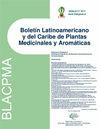富含抗氧化剂的药用植物作为治疗胃溃疡的潜在候选者
IF 0.7
4区 医学
Q4 INTEGRATIVE & COMPLEMENTARY MEDICINE
Boletin Latinoamericano y del Caribe de Plantas Medicinales y Aromaticas
Pub Date : 2023-09-30
DOI:10.37360/blacpma.23.22.5.41
引用次数: 2
摘要
氧化应激是胃肠道疾病的主要原因,主要是胃溃疡。多种内在和外在机制导致机体产生活性氧(ROS)。人体的抗氧化防御系统可以防止这些活性物质。当ROS产生的程度超过正常范围时,身体的自然防御系统无法中和这些危险的自由基,需要外源性的天然抗氧化剂。天然草药已被广泛用作抗氧化剂,以减轻胃溃疡中的氧化应激。多酚、单宁、精油、类黄酮,特别是槲皮素、类胡萝卜素、维生素C、维生素A和矿物质,由于它们具有显著的抗氧化作用,在生物测定中受到极大的关注。本文对几种天然抗溃疡药用植物及其抗氧化机制进行了综述。利用PubMed、Google Scholar和Scopus等电子数据库鉴定所有植物的抗氧化和胃保护潜力。本文章由计算机程序翻译,如有差异,请以英文原文为准。
Antioxidant rich medicinal plants as a potential candidate to treat gastric ulcer
Oxidative stress is a key cause of gastrointestinal disorders, primarily stomach ulcers. Multiple intrinsic and extrinsic mechanisms caused the body to produce reactive oxygen species (ROS). The body's antioxidant defense system protects against these reactive species. When the degree of ROS production exceeds the normal range, the body's natural defense system fails to neutralize these dangerous free radicals, necessitating need foran exogenous source of natural antioxidants. Natural herbal remedies have been widely employed as antioxidants to relieve oxidative stress in gastric ulcers. Polyphenols, tannins, essential oils, flavonoids, notably quercetin, carotenoids, vitamin C, vitamin A, and minerals are among the molecules of immense interest in bioassays due to their significant antioxidant effects. In the present review, several natural anti-ulcer medicinal plants along with their antioxidative mechanism have been reported. Electronic databases including PubMed, Google Scholar and Scopus were explored to identify the antioxidant and gastroprotective potential of all the plants.
求助全文
通过发布文献求助,成功后即可免费获取论文全文。
去求助
来源期刊

Boletin Latinoamericano y del Caribe de Plantas Medicinales y Aromaticas
PHARMACOLOGY & PHARMACY-
CiteScore
1.30
自引率
14.30%
发文量
49
审稿时长
6-12 weeks
期刊介绍:
The Boletín Latinoamericano y del Caribe de Plantas Medicinales y Aromáticas (BLACPMA), [Latin American and Caribbean Bulletin of Medicinal and Aromatic Plants]; currently edited by the publishing house MS-Editions, is a bi-monthly international publication that publishes original peerreviewed research in the field of medicinal and aromatic plants, with nearly 20 years of experience. BLACPMA is a scientific journal that publishes two types of articles: Reviews (only in English) and Original Articles (Spanish or English), its main lines of action being agronomy, anthropology and ethnobotany, industrial applications, botany, quality and standardization, ecology and biodiversity, pharmacology, phytochemistry, pharmacognosy, regulatory and legislative aspects. While all areas of medicinal plants are welcome and the experimental approaches used can be broad and interdisciplinary; other areas of research that are not mentioned depend on the Editorial Committee for their acceptance.
 求助内容:
求助内容: 应助结果提醒方式:
应助结果提醒方式:


